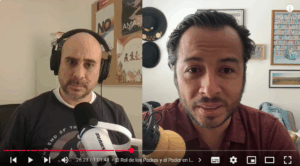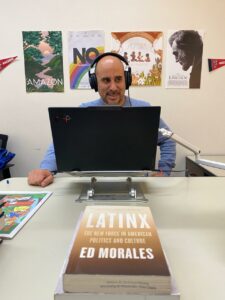At a moment when politics often feels polarized and overwhelming, PhD candidate Elohim Monard is creating space for thoughtful dialogue. His new podcast, Conversando de Política, highlights the voices of political communication scholars from around the world and explores how politics, communication and geopolitics intersect across the Americas.
We spoke with Monard about the inspiration behind the podcast, why he turned to podcasting as a platform, and what he hopes listeners will take away from these conversations.
 What inspired you to launch Conversando de Política, and why did you choose podcasting as your platform to explore political communication and geopolitics in the Americas?
What inspired you to launch Conversando de Política, and why did you choose podcasting as your platform to explore political communication and geopolitics in the Americas?
On the one hand, I am a believer that there must be bridges between academia and the world outside this beautiful bubble, so I see my podcast as a humble attempt. On the other hand, in my earlier professional life, I worked as the Head of the Political Section at the British Embassy in Peru, where I did what I love: discussing politics while sharing insights and analysis.
This is what I am trying to do in my podcast now. Its literal translation could be “Conversing about politics.” By doing so, I leverage my scholarship and connect it with my previous experience. Podcasting is the best strategy for this because it is essentially oral, but it is also multi-platform, so you can watch it or read it as well.
In one phrase: what I try to do with my podcast is to connect the dots. My own dots.
How does your background as a PhD student in political communication inform the podcast’s themes and the way you approach conversations with your guests?
As a political communication scholar, a podcast portrays political communication, both in its form and content. In these times of rapid, vertiginous communication, having long conversations to unpack an issue of public concern is no longer a common practice outside specialized niches, as it is in academia.
 In journalistic terms, my podcast is a talk show or interview program. In theoretical terms, it adopts a deliberative approach, nurtured by my readings of Habermas, inspired by a reading group I joined here with Professor Lew Friedland on the Theory of Communicative Action. I am naturally talkative, but the podcast challenges me to focus on listening. By the way, we recently published a paper on listening with my colleague Diego Mazzorra.
In journalistic terms, my podcast is a talk show or interview program. In theoretical terms, it adopts a deliberative approach, nurtured by my readings of Habermas, inspired by a reading group I joined here with Professor Lew Friedland on the Theory of Communicative Action. I am naturally talkative, but the podcast challenges me to focus on listening. By the way, we recently published a paper on listening with my colleague Diego Mazzorra.
Fortunately, the podcast format also embraces, and maybe it’s recovering, the old-school style of having long conversations. That said, some episodes give more weight to political communication, like the one on fact-checking, while others prioritize geopolitics, including organized crime and violence.
Your first episode features Roberta Braga, a Brazilian alum of UW-Madison and founder of the Digital Democracy Institute of the Americas. Why did you choose her as your debut guest, and what stood out most from your conversation?
Roberta herself and the work she does represent the spirit of my podcast in many ways. First, as you mentioned, she is a Badger who studied at our school during her undergrad years. She recalls Professors Hernando Rojas and Dhavan Shah, for example, who are both part of my dissertation committee.
Second, she is a Brazilian woman who speaks English and Spanish fluently in addition to her native Portuguese. This portrays the regional approach I offer in my podcast. From Argentina to Canada, we share the same territory, which we commonly refer to as the Americas. She shares a geopolitical approach from the communication perspective (or vice versa).
Third, and related to that, the important organization she leads, Digital Democracy Institute of the Americas (DDIA), analyzes misinformation and political narratives across the Americas. These topics are at the core of my dissertation project. Hence, there was no better match for my very first episode.
Roberta’s work touches on misinformation, digital narratives, and healthier online spaces for Latinx and Latin American communities. What insights from that discussion do you think are most urgent or eye-opening for listeners?
In this episode, we explored with Roberta how (mis)information circulates among Latino communities in the U.S. and Latin America, with issues and narratives transcending national borders via social media platforms.
One platform that her organization pays attention to is WhatsApp — a very difficult one to research for scholars due to privacy concerns. While less relevant for most U.S. Americans, WhatsApp is the most popular social media app in Latin America and among Latin Americans, Latinos or Latinx in the U.S.
Political information and misinformation are present in one-to-one and group conversations via WhatsApp. Roberta highlighted that politics usually accounts for a small portion of the overall conversation, often mixed or embedded among show business, sports, buying and selling, or humor.
However, this small proportion quickly spreads among WhatsApp groups and then to other countries, communities and individuals. More importantly, misinformation fosters uncertainty and fear. This creates opportunities for digital scams that disproportionately affect communities already struggling with structural barriers.
She shared useful tips to prevent misinformation, like always being aware of your emotions when scrolling through social media — a difficult one, but no less relevant for that.
The podcast is in Spanish – how did you think about language and audience when designing the show?

This was a difficult decision to make, but I am now very comfortable with it. The first question was: Who am I and what can I offer? A Peruvian communication and policy professional, with some experience in political analysis, who is now in the U.S. training to thrive in the top academic market in the field of communication. I wanted to offer engaging political conversations and deep analysis in a friendly manner.
How do I differentiate myself from the current podcast content? The Latin American podcasts market is a “blue ocean” for political analysis, in marketing terms, while the U.S. market is already saturated. Not a minor thing, to your question, competing in the U.S. in English with a Latin American accent would have been more challenging.
I’ve learned my audience is very diverse and sometimes unexpected once online. It is now comprised of political and risk analysts, government and communication practitioners, and scholars. Sometimes, business executives, including investment officers. I also receive a lot of reactions from university students in Latin America.
What has been the biggest challenge – and the biggest reward – so far in creating Conversando de Política?
The biggest challenge was to start. The idea had been on my mind for a couple of years, but I was eventually lucky.
 This is how it started: I was interviewed about Latin American politics once or twice a year by Jacob Shapiro, a political analyst and podcaster whom I met on LinkedIn a few years ago, thanks to our shared interests. We became friends, and he visited Madison as a speaker for the Dairy Producers Business Conference a few times, so we would go out to dinner.
This is how it started: I was interviewed about Latin American politics once or twice a year by Jacob Shapiro, a political analyst and podcaster whom I met on LinkedIn a few years ago, thanks to our shared interests. We became friends, and he visited Madison as a speaker for the Dairy Producers Business Conference a few times, so we would go out to dinner.
In one of our conversations, I shared my old interest in starting a podcast and asked him for insights on how to get started. I knew that production would take time in terms of the learning curve, and that it would compete with my academic agenda. Surprisingly, he offered to back my project by providing all the production, so I just had to record each episode.
The next day, maybe the very same day, he provided me with an account on his Zencastr platform and introduced me to his producer, who would create the podcast channels, edit the recordings, and post each episode with the appropriate content. I said to myself, “This is an opportunity I cannot dismiss. I knew it wouldn’t be perfect at first, but I have to start.”
And here I am. The first episode was posted on March 25 this year, which happened to be my son’s birthday. We now have nine episodes posted, plus three that are already recorded. The most gratifying reward is the connection with my interviewees. I amplify their ideas while letting them elaborate on them. In the meantime, I have learned from them and strengthened both my professional and personal relationships.
What can listeners expect from future episodes, and how do you hope the podcast contributes to broader conversations about democracy and communication in the Americas?
A core source of conversation is our very own academic community. For example, I had a great episode with Professor Hernando Rojas, as an advisor to his advisee, discussing the situation of universities and international students in the US during the Donald Trump administration. I also interviewed Professor Sara McKinnon about the changing migration patterns in the Americas.
The following episode will feature Professor Martin Echeverria, a political communication scholar from Mexico, on the Latin Americanization of US Politics. This is the same title as a lecture he gave at our school here in February. Following this, we have invited Professor Juan Agulló, a Spanish geopolitical scholar residing in Brazil, to discuss Brazil’s place in the world. This is an excuse to discuss its current relationship with the USA and South America.
Finally, one previous episode that I love is the one about literature and politics in the life of Mario Vargas Llosa, the Peruvian Nobel Prize winner in Literature, who passed away recently. We focused on a constant in his work: the tension between power and the individual, between oppression and freedom, between keeping silent after authoritarianism or confronting it, even if failure is inevitable. Sound familiar?